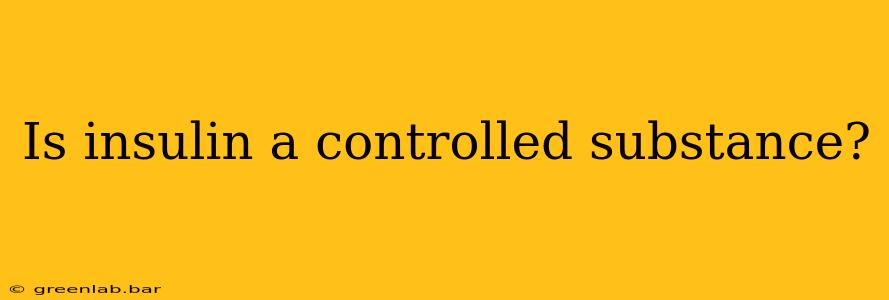Insulin is a critical hormone for millions of people with diabetes, regulating blood sugar levels and enabling them to lead healthy lives. However, a common question arises: is insulin a controlled substance? The short answer is no, insulin is not a controlled substance under the Controlled Substances Act (CSA) in the United States or similar legislation in most other countries.
Understanding the Controlled Substances Act (CSA)
The CSA classifies certain drugs based on their potential for abuse and medical use. These classifications range from Schedule I (high potential for abuse, no accepted medical use) to Schedule V (low potential for abuse, accepted medical use). Drugs listed under the CSA are subject to strict regulations concerning manufacturing, distribution, and prescribing.
Why Insulin Isn't a Controlled Substance
Insulin's lack of inclusion on the CSA schedule stems from several key factors:
- Low Potential for Abuse: Unlike opioids or stimulants, insulin doesn't produce a euphoric effect when misused. Its primary function is to regulate blood sugar, and its effects are largely dependent on the individual's existing glucose levels. Misuse rarely leads to recreational drug-seeking behavior.
- Medical Necessity: Insulin is a life-saving medication for people with type 1 diabetes and many with type 2 diabetes. Strict regulations could severely limit access for those who rely on it for survival.
- Highly Regulated Production and Distribution: While not a controlled substance, insulin's production, distribution, and dispensing are still heavily regulated to ensure quality, safety, and accessibility. These regulations fall under different frameworks than the CSA, primarily focusing on pharmaceutical standards and patient safety.
Other Important Legal Considerations
While not a controlled substance, the acquisition and use of insulin are subject to various regulations:
- Prescription Requirements: In most jurisdictions, insulin requires a prescription from a licensed healthcare professional. This ensures that patients receive appropriate doses and monitoring to prevent complications.
- Insurance Coverage: Insurance companies typically cover insulin, understanding its crucial role in managing diabetes. However, the cost of insulin remains a significant concern for many patients.
- Counterfeit Drugs: The high demand for insulin makes it a target for counterfeiters. Purchasing insulin from unregulated sources is risky and may lead to serious health consequences.
Conclusion: Safeguarding Access to Essential Medication
The fact that insulin isn't a controlled substance shouldn't be interpreted as a lack of regulation. Instead, it reflects a balanced approach that prioritizes access to this life-saving medication while maintaining safety and quality control. The focus remains on responsible prescribing, safe distribution, and affordable access for all individuals who require it. Concerns about cost and access are ongoing issues that require continued attention and advocacy. Always obtain insulin from legitimate sources and consult with your doctor for proper dosage and management of your diabetes.

